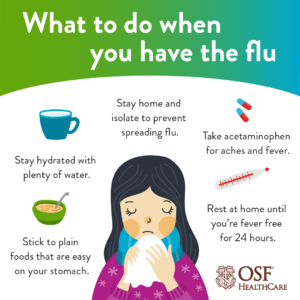
Flu treatment tips for adults
Each flu season, anywhere between 3% and 11% of the entire U.S. population gets sick with the flu, according to the U.S. Centers for Disease Control and Prevention. That means anywhere between about 10 million and 36 million people will catch the flu during any given flu season, which runs typically from late October until around April.
Mohammed S. Khan, MD, is a primary care physician at OSF HealthCare. Professionally, he fights the good fight against the flu every year, and he knows the impact the flu can have, especially on the very young, the elderly and those with pre-existing health issues. He shares his expertise below to help you navigate flu season.
Do you have the flu?
During flu season, there are typically “a lot of things going around,” Dr. Khan said. Common colds and other respiratory viruses spread as people spend more time indoors during the cold months of winter.
So how do you know if what you have is the flu?

According to Dr. Khan, the symptoms of the common cold progress gradually, starting usually with a runny nose or congestion.
Flu, on the other hand, has a more “vigorous onset,” with multiple symptoms striking at the same time – fever, chills and body aches in addition to symptoms like sore throat and runny nose that are shared with the cold.
How long does the flu last?
Flu can last anywhere from one day to a whole week. If you are vaccinated, there is a chance you’ll endure a shorter infection.
Once you have been free of fever for 24 hours without the need for fever-reducing medications like acetaminophen, you are safe to go out in the world without risk of spreading the flu.
How to recover at home
Unfortunately, science has not turned up any special home remedy for flu. There is no magical cure.
If you have the flu, here is what Dr. Khan recommends:
- Stay home and isolate as much as possible to prevent spreading the virus.
- Wash your hands often.
- Stay hydrated by drinking plenty of water.
- Eat foods that are easy on your stomach.
- Take acetaminophen for aches and fever.
- Rest.
It’s not too late to get your flu shot
If your symptoms are getting worse, see your health care provider to find out if you need medication.
And if you have any underlying health conditions, “It’s always good to see a health care provider earlier than later, preferably in the first two days of infection,” Dr. Khan said.
Getting started on treatment early can help reduce the length of severity of your illness.